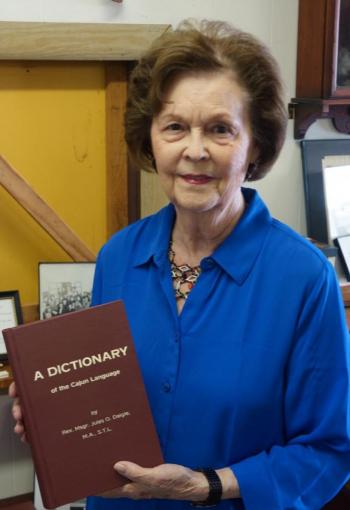Welsh seeks title as Cajun dictionary home
The town of Welsh, some 25 miles east of Lake Charles, has become a point of interest in the halls of power at the Louisiana State Capitol.
Among contentious legislative debates over funding cuts, revising the constitutional limitations and eliminating tax breaks, is a resolution that would allow this quaint town with a population that maybe touches 3,000 to call itself “The Official Home of the Cajun Dictionary.”
House Concurrent Resolution 10, co-authored by a pair of Republican Jennings lawmakers, Reo, Johnny Guinn and Sen, Dan “Blade” Morrish would give Welsh that distinction. Earlier this week, it passed through the House Committee on Municipal, Parochial, and Cultural Affairs on Thursday and is now before the full house chamber for consideration.
There seems little opposition.
“A Dictionary of the Cajun Language” was compiled, in long hand, by the late Monsignor Jules O. Daigle and published in 1984. Daigle was pastor of Our Lady of Seven Dolors Catholic Church in Welsh for 44 years. After retiring in 1974, he devoted his time to compiling the dictionary, along with it’s companion book “Cajun Self-Taught,” which was published in 1996.
It is now housed in the Welsh Museum, along with Daigle paraphernalia.
The dictionary, a nearly 600-page tome, contains not only an impressive list of Cajun words and meanings in English, but also addresses common misconceptions about the language and people.
Are Cajuns superstitious, lazy, bums and drunks? Only in the same proportion as the rest of the American population, lectures Daigle. Is the Cajun language just bad French? Only if you consider Spanish and French “bad Latin.” Daigle calls Cajun a language “made in Louisiana, by Louisianans, for Louisianans.”
His dictionary also is available for at the LSU Middleton Library.
In Welsh, however, Daigle, who died in 1998, has a reputation that extends far beyond the bindings of his dictionary. As the priest at Seven Dolors, he made a lasting impression on the community.
Welsh Mayor Carolyn Louviere remembers when she was just a teenager going with her family to Daigle’s camp on the Mermentau River after Sunday mass, where her father would barbeque. Daigle remained a significant figure in her life going forward, she said, even baptizing her children.
“I was very close to him,” Louviere said. “As many people were.”
Mary Sue Lyon, who curates the Welsh Museum, was one of those people. She was baptized, confirmed, and married by Daigle. Then he baptized her six children.
She remembers visiting him as he was working on the dictionary with stacks of pages written in longhand piled on his desk. Daigle didn’t type.
“He was a brilliant man,” said Lyon, “and he had a love for the Cajun people.” Lyon says he knew eight languages, and knew something about everything.
Rep. Guinn received some friendly pushback in the committee meeting, when Rep. Mike Huval, R- Breaux Bridge, questioned how many Cajuns actually lived in Welsh.
“Once you get past Crowley on the west the Cajuns pretty much just fade away,” said Huval in the meeting (though he supported the resolution).
But Lyon says that while Welsh is usually thought of as being founded by mid-westerners, in fact the Acadians were there first. Daigle wanted to bring back that culture, she says.
The designation would be a positive addition to the town’s image, and Mayor Louviere says that “Home of the Cajun Dictionary” would be something they could add to their official town stationary.
But it seems that for those in Welsh, the honor is as much about the memory of Father Daigle as it is about the book.
“He was a priceless man,” said Lyon.
Contact Nick Chrastil at nchras1@lsu.edu.
- Log in to post comments

